
Journal of Digital Forensics Security and Law
Scope & Guideline
Where Innovation Meets Legal Insight.
Introduction
Aims and Scopes
- Digital Forensics Methodologies:
The journal emphasizes the development and evaluation of new methodologies for digital forensics, including software tools and analytical frameworks that improve the accuracy and efficiency of forensic investigations. - Legal Frameworks and Ethical Considerations:
It explores the intersection of digital forensics with legal standards and ethical issues, examining how digital evidence is treated within different legal jurisdictions and the implications for privacy and security. - Emerging Technologies in Forensics:
The journal focuses on the impact of emerging technologies, such as artificial intelligence, machine learning, and IoT, on digital forensics, investigating how these advancements can be integrated into forensic practices. - Collaborative Tools for Digital Investigations:
Research on collaborative tools and methodologies for digital investigations, especially in complex cases involving multiple stakeholders, is a key area of focus. - Security Threats and Vulnerabilities:
The journal addresses current and emerging security threats that impact digital forensics, including malware, phishing attacks, and vulnerabilities in hardware and software.
Trending and Emerging
- Machine Learning Applications in Forensics:
There is an increasing focus on the application of machine learning techniques in digital forensics, particularly in areas such as image analysis and automated evidence triage, highlighting the potential for AI to transform forensic methodologies. - Forensic Readiness and Preparedness:
Emerging research on digital forensic readiness frameworks, particularly in relation to BYOD (Bring Your Own Device) policies, emphasizes the need for organizations to be proactive in preparing for potential digital investigations. - Impact of IoT on Forensic Investigations:
The integration of IoT devices in forensic investigations is gaining traction, with a focus on understanding the unique challenges and methodologies required to effectively investigate incidents involving interconnected devices. - Cross-Border Digital Evidence Collection:
Research exploring the complexities of cross-border collection of digital evidence is trending, as globalization increases the need for standardized practices and legal cooperation among jurisdictions. - Collaborative Digital Investigation Tools:
The development of collaborative tools for digital investigations, especially in relation to dark web content and shared investigations, is an emerging theme that reflects the need for cooperation among investigators.
Declining or Waning
- Traditional Digital Forensics Techniques:
There is a noticeable decline in publications focused solely on traditional digital forensics techniques, such as basic data recovery and analysis, as the field evolves to incorporate more advanced and integrated approaches. - Legal Case Studies:
Research centered on case studies of legal proceedings involving digital evidence has decreased, possibly due to the growing emphasis on theoretical frameworks and technological advancements rather than specific legal outcomes. - General Cybersecurity Practices:
Topics that broadly cover cybersecurity practices without a specific focus on digital forensics, such as general antivirus solutions, are less frequently addressed, indicating a shift towards more specialized discussions within the journal.
Similar Journals
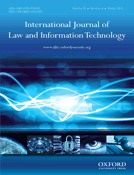
International Journal of Law and Information Technology
Charting New Territories in Law and Information Sciences.The International Journal of Law and Information Technology, published by Oxford University Press, stands as a leading forum for the exploration of the evolving intersection between law and information technology. With its ISSN 0967-0769 and E-ISSN 1464-3693, this esteemed journal has been at the forefront of academic discourse since its inception in 1993 and is poised to continue influencing the landscape of legal scholarship and information sciences until at least 2024. With a prestigious categorization in the Q2 quartile for both Law and Library and Information Sciences, the journal is prominently ranked in the 76th and 64th percentiles respectively within Scopus rankings. Offering insights on vital themes such as privacy, intellectual property, and technological regulation, the International Journal of Law and Information Technology provides a valuable resource for researchers, practitioners, and students alike, facilitating a deeper understanding of the legal challenges and opportunities presented by technological advancements. While not an open-access publication, the rigorous peer-reviewed articles serve to enrich the global academic community’s knowledge in this critical and dynamic field.

MINNESOTA LAW REVIEW
Innovating Legal Perspectives for a Dynamic WorldMINNESOTA LAW REVIEW is a prestigious academic journal dedicated to advancing legal scholarship and discourse, published by the MINN LAW REVIEW FOUND in the United States. Established in 1976, this journal has become a cornerstone in the field of law, achieving an impressive Q1 ranking in the Law category for 2023, underscoring its significance and influence in legal studies, with a Scopus rank placing it in the 65th percentile among social sciences law journals. The ISSN number for both print and electronic editions is 0026-5535, ensuring broad accessibility to its scholarly contributions. With a commitment to publishing innovative and analytical articles that address contemporary legal issues, the MINNESOTA LAW REVIEW serves as an essential resource for researchers, students, and legal professionals seeking to deepen their understanding and engage with critical legal concepts. While it does not currently provide open access, its wide array of topics spans various disciplines within law, fostering a vibrant academic community dedicated to the exploration of legal principles and their applications. The journal’s editorial office can be found at 229 19TH AVE SOUTH, UNIVERSITY OF MINNESOTA, MINNEAPOLIS, MN 55455, where a team of experts curates content that reflects the evolving landscape of legal thought.
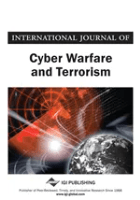
International Journal of Cyber Warfare and Terrorism
Exploring Interdisciplinary Approaches to Cyber ThreatsThe International Journal of Cyber Warfare and Terrorism is a critical resource for researchers, professionals, and students exploring the multifaceted domains of cybersecurity, warfare, and the implications of digital terrorism. Published by IGI Global, this journal provides a platform for innovative and interdisciplinary research, contributing significantly to the understanding of current challenges in the digital landscape. With an ISSN of 1947-3435 and E-ISSN 1947-3443, the journal covers a range of essential categories, including Computer Networks and Communications, Hardware and Architecture, and Information Systems Management, reflecting its commitment to addressing urgent issues in computer science and safety research. Though currently categorized in Q4 of multiple scientific sectors, the journal stands as a beacon for emerging scholarly thought and practical applications in combating cyber threats and enhancing digital resilience. While the journal is not open access, its findings are crucial for academic discourse and policy-making in an increasingly interconnected world, making it a valuable asset for anyone involved in the study of cyber threats and defenses.

Cybersecurity
Exploring the Frontiers of Cyber Defense and ResilienceCybersecurity, published by SpringerNature, serves as a pivotal platform in the realms of Artificial Intelligence, Information Systems, Software, and Computer Networks and Communications. With an impressive Impact Factor and an Open Access model initiated in 2018, this journal facilitates widespread dissemination of innovative research findings to a global audience. Based in the United Kingdom, Cybersecurity aims to advance knowledge and application in security innovations, risk management, and system resilience against cyber threats. The journal's current standing is prominently reflected in its Q1 and Q2 ratings across various computer science categories, indicating its reputable contribution to the academic community. By continuously publishing cutting-edge research, Cybersecurity plays a crucial role in informing policy decisions, advancing technology, and enhancing the collective understanding of cyber resilience, making it an essential resource for researchers, professionals, and students alike.
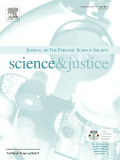
SCIENCE & JUSTICE
Unraveling Truth at the Intersection of Science and Law.Science & Justice is a leading international journal published by Elsevier Science Ltd, dedicated to the interdisciplinary examination of the intersection of justice and science, especially within the realms of forensic science and pathology. Established in 1995, this reputable journal has garnered a commendable Q2 rank in the category of Pathology and Forensic Medicine, reflecting its significant contributions to advancing knowledge in these critical fields. With an ISSN of 1355-0306 and an E-ISSN of 1876-4452, the journal is indexed in Scopus, positioning it in the top 68th percentile among its peers. The objectives of Science & Justice include promoting research that bridges scientific methodologies with justice-related applications, making it an invaluable resource for researchers, professionals, and students alike. As the journal continues to evolve, it aims to interface scientific innovations with forensic practices, thereby enhancing the integrity of justice processes globally. Despite not offering Open Access options, it remains a pivotal reference point within the academic community focused on forensic science methodologies and their legal implications.

Revista Juridica de Castilla y Leon
Empowering Dialogue in Law and GovernanceRevista Juridica de Castilla y Leon is a prestigious academic journal dedicated to advancing legal scholarship in the field of law and governance. Published by the JUNTA CASTILLA & LEON, CONSEJERIA PRESIDENCIA & ADM TERRITORIAL, this journal plays a vital role in disseminating high-quality research and foster dialogue among legal practitioners, researchers, and students alike. Since transitioning to Open Access in 2003, it has removed barriers to knowledge, allowing a global audience uncontrolled access to innovative legal studies and practices. With its ISSN 1696-6759 and E-ISSN 2254-3805, the journal is committed to publishing articles that address contemporary issues and challenges in the legal landscape, particularly those relevant to the Spanish context. As a reliable source for its readers, Revista Juridica de Castilla y Leon contributes significantly to the field of law, encouraging interdisciplinary research and collaboration to influence policy and improve legal frameworks in Spain and beyond.

ERCIM News
Unveiling Cutting-Edge Insights in Mathematics and InformaticsERCIM News is a leading publication in the field of informatics and mathematics, sponsored by the European Research Consortium for Informatics and Mathematics (ERCIM). With an ISSN of 0926-4981 and E-ISSN 1564-0094, this journal serves as a vital platform for sharing innovative research and developments across Europe and beyond. Although it operates under a subscription model, the content remains accessible to a wide audience of researchers, professionals, and students interested in advancing their knowledge in computational sciences and mathematical applications. The journal’s primary objective is to disseminate cutting-edge research, technological advancements, and insights from various fields of informatics, promoting collaboration and exchange among experts. Based in the heart of Sophia Antipolis, France, ERCIM News not only contributes to the academic community but also plays a crucial role in shaping the future of scientific research and innovation.
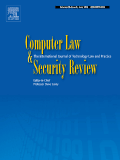
Computer Law & Security Review
Exploring the Frontiers of Computer Law and SecurityComputer Law & Security Review, published by Elsevier Advanced Technology, is a premier academic journal focused on the intersection of technology, law, and cybersecurity. Since its inception in 1985, the journal has established itself as a vital resource for researchers, professionals, and students interested in the rapidly evolving landscape of information technology and legal frameworks. With an impressive Q1 ranking in both the law and miscellaneous business categories and a significant 95th percentile ranking in the field of social science law, this journal is recognized for its high-impact contributions to the field. It covers essential issues pertaining to computer law, data protection, intellectual property, and regulatory compliance, supporting academic rigor and practical application. Although the journal does not offer open access, it remains influential in shaping policy and practice by providing insightful analyses and fostering discussions that drive innovation and reflect contemporary challenges in the digital age. For those passionate about the convergence of law and technology, Computer Law & Security Review is an indispensable academic publication.
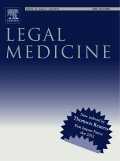
Legal Medicine
Exploring the intersection of health and justice.Legal Medicine, ISSN 1344-6223, published by ELSEVIER IRELAND LTD, stands as a pivotal academic journal within the realms of forensic medicine and legal ethics. Operating from the Netherlands, this journal has established a strong reputation among researchers and practitioners since its inception in 1999, with the goal of advancing knowledge in the intersection of legal and medical disciplines. With a commendable Q2 categorization in both Issues, Ethics and Legal Aspects and Pathology and Forensic Medicine, it ranks among the noteworthy publications in these fields, placing it in the 51st percentile for Pathology and Forensic Medicine and 51st for Nursing-related ethical issues. The journal not only serves as a repository for innovative research and practical case studies but also emphasizes the importance of ethical considerations in medical legal scenarios. Although it does not offer Open Access options, it remains a crucial resource for professionals, researchers, and students seeking to stay informed about the latest developments that shape legal medicine. Access to its contents promises to enhance understanding and inspire advancements in both forensic science and the ethical frameworks surrounding them.

Law Technology and Humans
Unveiling the Impact of Technology on Legal FrameworksLaw Technology and Humans is an innovative open-access journal published by Queensland University of Technology in Australia. Since its inception in 2019, it has emerged as a vital platform for scholarly discourse at the intersection of law, technology, and society, addressing pertinent challenges and advancements from 2019 to 2024. With categories spanning from Law and Social Sciences to Biotechnology and Information Systems, the journal caters to a diverse audience, achieving respectable rankings within its field—ranked #382 in Social Sciences (Law) and within the 62nd percentile in 2023. As a practitioner or researcher navigating the rapidly evolving landscape of tech law, Law Technology and Humans serves as an essential resource, fostering interdisciplinary collaboration and providing critical insights into the implications of technological innovation. By maintaining an open-access format, the journal enhances accessibility, promoting widespread engagement and knowledge sharing among academics, professionals, and students globally.